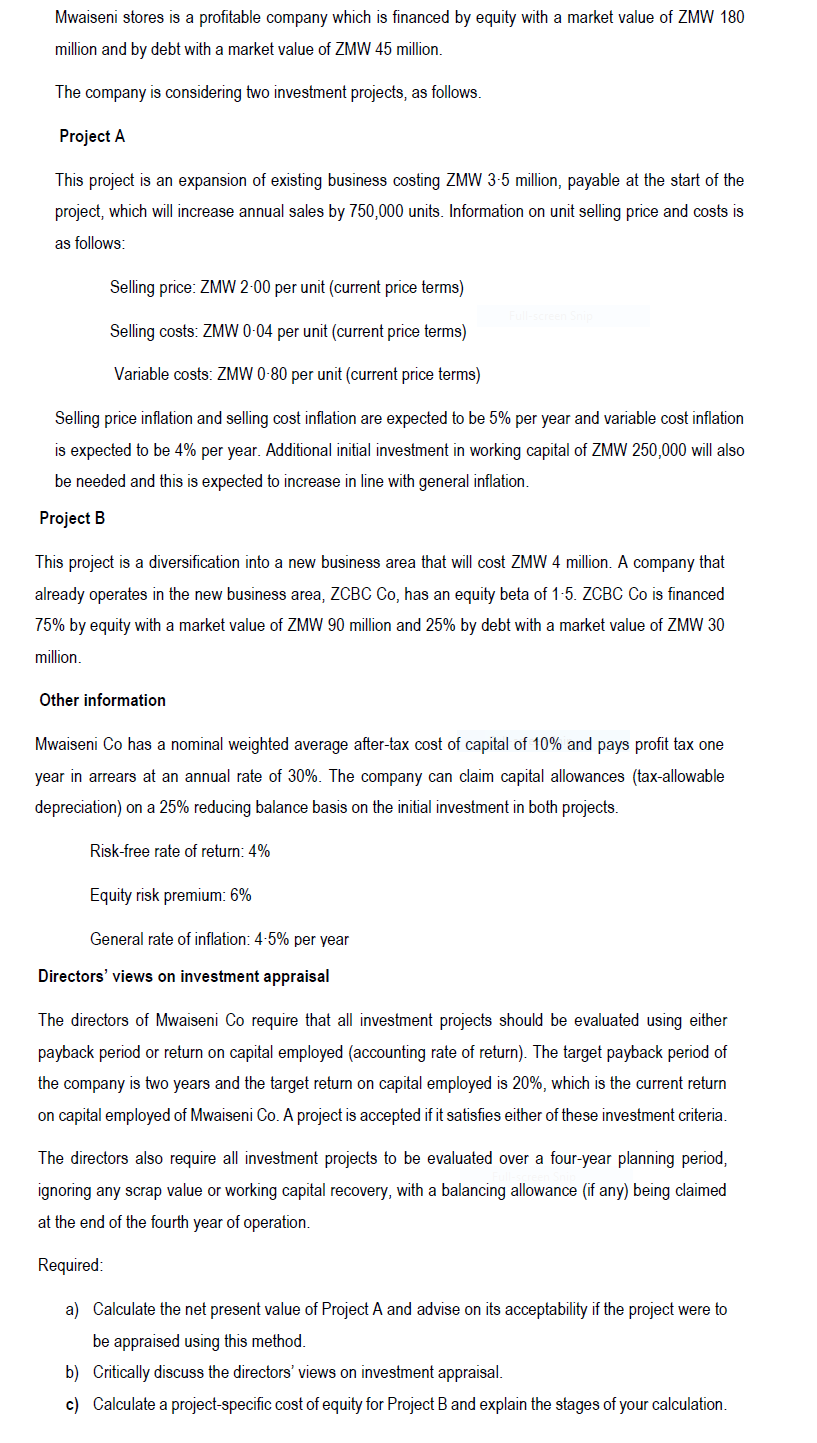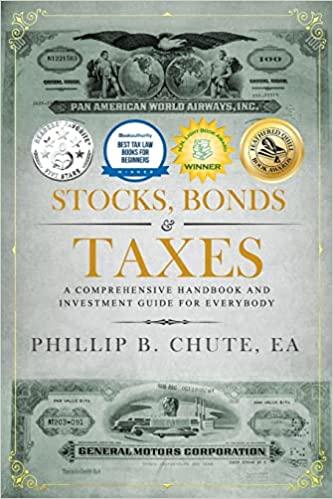
Mwaiseni stores is a profitable company which is financed by equity with a market value of ZMW 180 million and by debt with a market value of ZMW 45 million. The company is considering two investment projects, as follows. Project A This project is an expansion of existing business costing ZMW 3.5 million, payable at the start of the project, which will increase annual sales by 750,000 units. Information on unit selling price and costs is as follows: Selling price: ZMW 200 per unit (current price terms) Selling costs: ZMW 0.04 per unit (current price terms) Variable costs: ZMW 0.80 per unit (current price terms) Selling price inflation and selling cost inflation are expected to be 5% per year and variable cost inflation is expected to be 4% per year. Additional initial investment in working capital of ZMW 250,000 will also be needed and this is expected to increase in line with general inflation. Project B This project is a diversification into a new business area that will cost ZMW 4 million. A company that already operates in the new business area, ZCBC Co, has an equity beta of 1.5. ZCBC Co is financed 75% by equity with a market value of ZMW 90 million and 25% by debt with a market value of ZMW 30 million. Other information Mwaiseni Co has a nominal weighted average after-tax cost of capital of 10% and pays profit tax one year in arrears at an annual rate of 30%. The company can claim capital allowances (tax-allowable depreciation) on a 25% reducing balance basis on the initial investment in both projects. Risk-free rate of return: 4% Equity risk premium: 6% General rate of inflation: 4.5% per year Directors' views on investment appraisal The directors of Mwaiseni Co require that all investment projects should be evaluated using either payback period or return on capital employed (accounting rate of return). The target payback period of the company is two years and the target return on capital employed is 20%, which is the current return on capital employed of Mwaiseni Co. A project is accepted if it satisfies either of these investment criteria. The directors also require all investment projects to be evaluated over a four-year planning period, ignoring any scrap value or working capital recovery, with a balancing allowance (if any) being claimed at the end of the fourth year of operation. Required: a) Calculate the net present value of Project A and advise on its acceptability if the project were to be appraised using this method. b) Critically discuss the directors' views on investment appraisal. c) Calculate a project-specific cost of equity for Project B and explain the stages of your calculation. Mwaiseni stores is a profitable company which is financed by equity with a market value of ZMW 180 million and by debt with a market value of ZMW 45 million. The company is considering two investment projects, as follows. Project A This project is an expansion of existing business costing ZMW 3.5 million, payable at the start of the project, which will increase annual sales by 750,000 units. Information on unit selling price and costs is as follows: Selling price: ZMW 200 per unit (current price terms) Selling costs: ZMW 0.04 per unit (current price terms) Variable costs: ZMW 0.80 per unit (current price terms) Selling price inflation and selling cost inflation are expected to be 5% per year and variable cost inflation is expected to be 4% per year. Additional initial investment in working capital of ZMW 250,000 will also be needed and this is expected to increase in line with general inflation. Project B This project is a diversification into a new business area that will cost ZMW 4 million. A company that already operates in the new business area, ZCBC Co, has an equity beta of 1.5. ZCBC Co is financed 75% by equity with a market value of ZMW 90 million and 25% by debt with a market value of ZMW 30 million. Other information Mwaiseni Co has a nominal weighted average after-tax cost of capital of 10% and pays profit tax one year in arrears at an annual rate of 30%. The company can claim capital allowances (tax-allowable depreciation) on a 25% reducing balance basis on the initial investment in both projects. Risk-free rate of return: 4% Equity risk premium: 6% General rate of inflation: 4.5% per year Directors' views on investment appraisal The directors of Mwaiseni Co require that all investment projects should be evaluated using either payback period or return on capital employed (accounting rate of return). The target payback period of the company is two years and the target return on capital employed is 20%, which is the current return on capital employed of Mwaiseni Co. A project is accepted if it satisfies either of these investment criteria. The directors also require all investment projects to be evaluated over a four-year planning period, ignoring any scrap value or working capital recovery, with a balancing allowance (if any) being claimed at the end of the fourth year of operation. Required: a) Calculate the net present value of Project A and advise on its acceptability if the project were to be appraised using this method. b) Critically discuss the directors' views on investment appraisal. c) Calculate a project-specific cost of equity for Project B and explain the stages of your calculation







